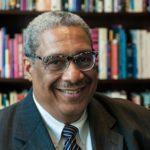The criminal legal system has long served as a sobering example of systemic racism in the U.S. Today, we see the overincarceration of Black and Brown people within our prisons — especially on death row — and legal processes that are wrought with racial biases.
Indeed, as long as our country continues to uphold killing as a response to killing and retribution as “justice,” people of color will bear the brunt of our legal system’s cruelty. In fact, it was designed to be that way.
Racism is systemically embedded within our country, and institutions across our society deny people of color their inherent human dignity.
The work of dismantling this system is shared by all ministries throughout the Church, from death penalty advocacy, to education, to media, and beyond. Yet so often our work is siloed, disconnected from one another.
The systems of racial injustice will never be broken down if we do not work together.
Our Journey to Montgomery
Recognizing the need for Church-wide collaboration on anti-racism efforts, Catholic Mobilizing Network recently gathered national Catholic ministry leaders for a Lenten pilgrimage to Montgomery, Alabama — the birthplace of the Civil Rights Movement.
The 33 participants of this trip included representatives from Catholic ministries such as America Media, Catholic Relief Services, Congregation of St. Joseph, Franciscan Mission Service, the Jesuit Conference, Network Lobby for Catholic Social Justice, Society of St. Vincent de Paul, and the Order of Malta — along with members of the CMN staff and board of directors.
Over the course of three days, our group visited landmarks of racial violence and resilience, reflected on the ways our ministries are called to respond, and discerned how we will proceed forward.
We walked across the Edmund Pettus Bridge in Selma, Alabama, singing songs of freedom and recalling the women, men, and children who walked that very path in a brave demonstration of resistance.
We explored the Equal Justice Initiative’s newly opened Legacy Museum: From Enslavement to Mass Incarceration, which takes visitors on an interactive journey that demonstrates the ways in which the same system of racism that bore the international slave trade continues to persist today.
We visited the National Memorial for Peace and Justice, which honors over 4,400 Black individuals who were victims of racial terror lynchings from 1877 to 1950.
And we ate dinner with local civil rights leaders, some of whom lived in Montgomery during the Bus Boycott of 1955–1956, who charged us to not let this trip be simple tourism, but rather the spark that ignites us to become “warriors for justice.”
Reckoning with the historical harms represented in these Alabama landmarks required us to engage in a deeper kind of listening that honored the stories and lived experiences of those who were harmed.
Throughout the pilgrimage we gathered together in peacemaking circles, a foundational practice of restorative justice, to reflect on ways to integrate our learnings into our ministerial work.
The experience of coming together in circle, a practice grounded in truth-telling and accountability, enabled us to move forward with courage and hope.
Where will we go from here?
In designing the pilgrimage, we purposefully centered this experience in the season of Lent, a time when Catholics are called to “repent and believe in the Gospel.” Repentance invites us not only to turn away from sin — like the sin of racism — but to turn towards God.
How can we turn towards God in our pursuit of justice?
We discovered that the answer to this question will look different for each of us. Racial justice work requires that we all bring our unique gifts, talents, and experiences to the table.
This work requires both learning and unlearning, listening and speaking up, confronting the harms of past and present while creating a better future.
It is essential that we do this work together.
The 33 pilgrims who arrived in Montgomery — many of us strangers, some of us old friends — departed with heavy but hopeful hearts, and a new sense of community.
Arm in arm we sang these words, words that have been sung by many before us, as we committed ourselves to the work ahead:
We shall overcome, we shall overcome,
We shall overcome someday;
Oh, deep in my heart, I do believe,
We shall overcome someday.



